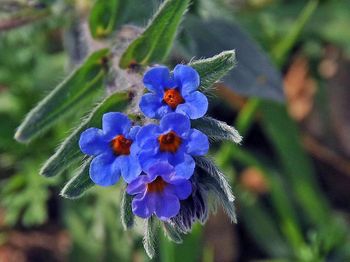Alkanna
From Wikiwel
Other Names: Alkanet, Alkanna lehmanii, Alkanna Radix, Alkanna tinctoria, Alkanna tuberculata, Anchusa, Anchusa bracteolata, Anchusa tuberculata, Buglosse des Teinturiers, Dyer's Bugloss, Henna, Lithospermum lehmanii, Orcanète, Orcanette, Orcanette des Teinturiers, Orchanet, Radix Anchusae.
Alkanna is a plant. The leaves and root are used to make medicine. The root is harvested in the autumn and can be dried for later use.
Special Precautions of Alkanna
- There’s a lot of concern about using alkanna as medicine, because it contains harmful chemicals called hepatotoxic pyrrolizidine alkaloids (PAs). Hepatotoxic PAs can block blood flow in the veins in the liver and cause liver damage. Hepatotoxic PAs might also cause cancer and birth defects. Some retailers of alkanna products attempt to remove these poisonous chemicals. If they meet certain purity standards, these products can be labeled “hepatotoxic PA-free.” Alkanna preparations that are not certified and labeled “hepatotoxic PA-free” are considered UNSAFE.
- It’s also UNSAFE to apply alkanna to broken skin. The dangerous chemicals in alkanna can be absorbed quickly through broken skin and can lead to dangerous body-wide toxicity. Steer clear of alkanna-containing skin products that aren’t certified and labeled “hepatotoxic PA-free.” There isn’t enough information to know if it’s safe to apply alkanna to unbroken skin. It’s best to avoid use.
- Pregnancy or breast-feeding: Don’t use alkanna if you are pregnant. Preparations that contain hepatotoxic pyrrolizidine alkaloids (PAs) might cause birth defects as well as liver damage. There isn’t enough information to know whether it’s safe to use hepatotoxic PA-free preparations during pregnancy. Stay on the safe side and avoid use.
- It’s also UNSAFE to use alkanna if you are breast-feeding. Hepatotoxic PAs can pass into breast milk and harm the nursing infant. There isn’t enough information to know whether it’s safe to use hepatotoxic PA-free preparations during breast-feeding.
- Liver disease: Alkanna contains chemicals called hepatotoxic pyrrolizidine alkaloids (PAs). These chemicals harm the liver, making existing liver disease worse.
- Medications that increase the breakdown of other medications by the liver (Cytochrome P450 3A4 (CYP3A4) inducers) interacts with ALKANNA
Benefits and uses of Alkanna are
The root is antibacterial, antipruritic, astringent and vulnerary.
- It is used externally in the treatment of varicose veins, indolent ulcers, bed sores and itching rashes.
- Despite serious safety concerns, people use alkanna for diarrhea and stomach ulcers.
- Alkanna is sometimes applied directly to the skin to heal wounds and treat skin diseases.
Dosage
Only External Use or for gargling (Boil leaves in water and gargle without swallowing.)
